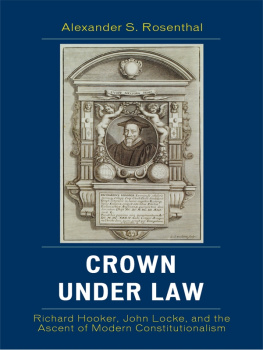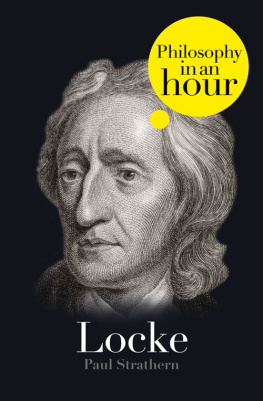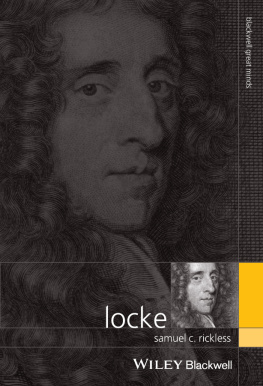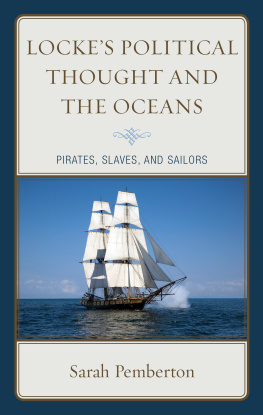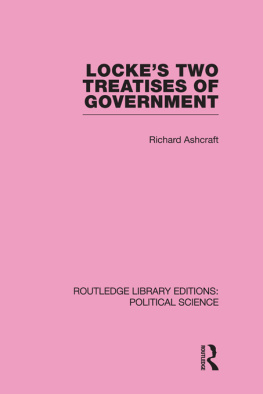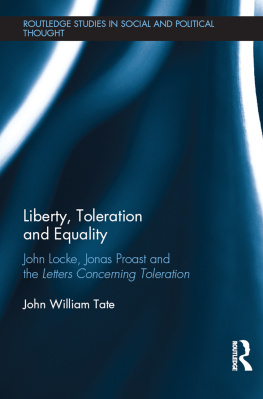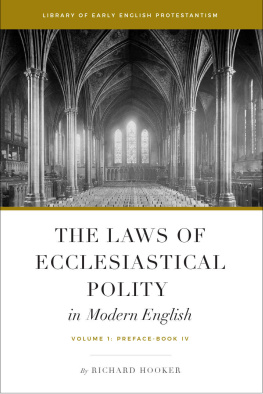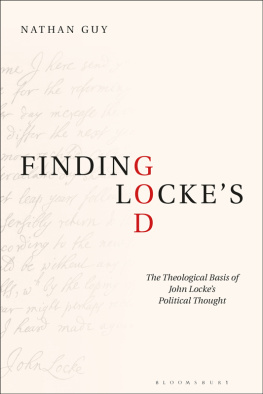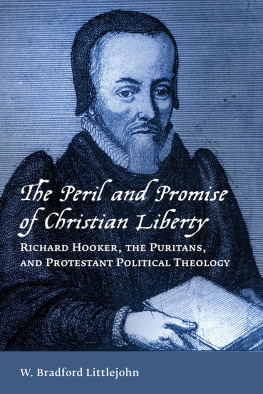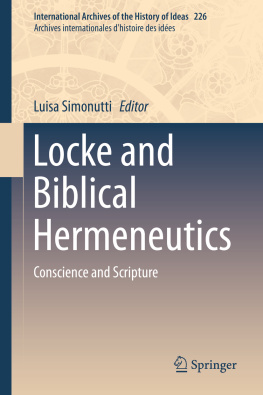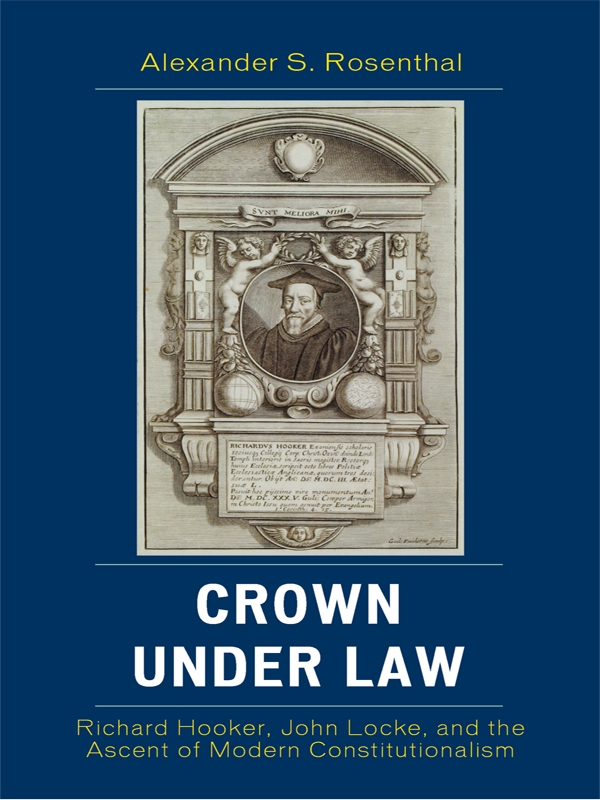I would like to begin by thanking the editors of Lexington Books and particularly Mr. Patrick Dillon and Ms. Macduff Stewart for undertaking this project and guiding me along this process. I should also like to thank the anonymous reviewer with his very thorough and helpful comments. As this project was conceived during my doctoral years at the Higher Institute of Philosophy at the Katholieke Universisteit Leuven in Belgium I would certainly like to direct attention to my intellectual mentors. First, Id thank my doctoral promoter Dr. Bart Raymaekers for his patient guidance, encouragement, and warm support for my project nourished by our discussions of political philosophy. It is thanks to Dr. Raymaekers, that I was able to find this new and for me felicitous direction for my academic pursuits, after the confusion and difficulty that followed the tragic death of my prospective promoter, Dr. Jos Decorte. I should also like to thank Dr. Martin Stone who went far beyond the call of duty to generously give of his time and of his extraordinary erudition in the field of medieval and renaissance philosophy to assist in this work. I would thank Ms. Kristina Pinto for her excellent work editing my introduction and conclusion, as well as Michael Funk Deckard for his assistance with the editing. The reader can be assured that whatever merits the formal aspect of this work has belongs to the editors, while any errors that remain are my responsibility alone. I would also like to thank my good friends David Pactwa and Biagio Tassone for very generous assistance provided at various point in my project. I should like to thank my parents, Arthur and Pili Rosenthal, for their constant love and support. Every son owes their parents an unpayable debt, but perhaps myself especially so, for all they have done for me in my life. I would like to thank my late, great aunt Dorothy Halpern whose generosity helped to make the continuance of my academic pursuits possible. I would like to thank an old friend Richard Evans who was one of the first to suggest the importance of Hooker as a political thinker to me, many years ago.
Appendix One
Straussianism and its Discontents
It is in part due to Straussianism that the rather facile assumptions of complete continuity between Hooker and Lockeand thus the simplistic reading of Hooker as an early proponent of a Whig political doctrine-have by now been generally replaced. The particular contribution of Leo Strauss to the question of Lockes relationship to Hooker was to expose some of the ambiguities within Lockes text, and to raise the question of whether his claim to be continuing rather then innovating upon the classic or traditional concept of natural law can be taken at face value.
An unfortunate side effect has been to contribute to the trend toward a general neglect of research into the place of Hooker within the debates of seventeenth-century political philosophy. Since Strauss constructs Locke as a modern, it follows that the extensive references to Hooker in his major texts are seen as merely part of a structure of subterfuge through which Locke is concealing his true aims and intentions. If this reading is correct, a close historical scrutiny of the place of Hooker in the late seventeenth century is of little intrinsic value in understanding Lockes political argument. Because Straussianism is a prominent influence in American scholarship, and on this account has a role in obstructing an understanding of the relevance of Lockes use of Hooker. We would do well to investigate some of the key themes that inform Strausss hermeneutics.
The Straussian project can be understood on one level as an effort to defend the idea of an eternal standard of moral and political truth, against what has occurred in modernity, specifically the attack on natural right in the name of history. The problem of history then is at the root of modern relativism. If truth in the moral and political sphere is radically contingent upon the historical conditions under which it is promulgated or apprehended, then the very notion of an unchanging and therefore supra-historical truth is brought into sharp question. Yet the notion that human reason is competent to discern moral standards by reflection upon the unchanging and universal ends and verities of nature, is precisely what for Strauss is at the core of what he terms classic natural right . This is the doctrine first promulgated by the Ancients (e.g. Socrates, Plato, and Aristotle) that more or less holds until the onset of modernity. Strauss places a special emphasis on the radicalism of the modern break from classic natural right. Neil G. Robertson has written that:
For Strauss, the history of political thought in the West is broken in two: the thought of the ancients, and that of the moderns... As an anti-historicist, Strauss does not characterize this break as a result of historical causes; but rather he sees it as a result of a re-conception of moral and political thought, a fundamental restructuring of how we conceive moral and political life.
What characterizes this break for Strauss is the reconceptualization of the concept of nature . This took place when the Aristotelian teleological model, in which there are intrinsic ends within nature independent of the human subject, was replaced with the ascent of modern science by a mechanistic model, in which nature has no intrinsic purposes and purpose is something imposed by the human subject. Thus, Robertson continues:
At the centre of our moral and political self-understanding, for Strauss, is the notion of nature, i.e., what is given prior to human willing. From his earliest writings, the division between modern and ancient was characterized by a distinction concerning what is meant by nature. In Comments on Der Begriff des Politischen Strauss points to two fundamental concepts of nature: whether as an order seen as a model or whether as disorder which is to be removed. In The Political Philosophy of Hobbes , Strauss writes: Traditional natural law is primarily and mainly an objective rule and measure, a binding order prior to, and independent of, the human will, while modern natural law is, or tends to be, primarily and mainly a series of rights, of subjective claims, originating in the human will.
This manner of presenting the matter leaves the ancients and the moderns in a condition of radical opposition, with little room for synthesis, or for explicating lines of historical development from one to the other. Where a thinker appears to have certain elements characteristic of the ancients and others of the moderns, ultimately they must stand to the one side or the other of the chasm, and the discrepancies are either a consequence of inconsistency or a consequence of mechanisms of concealment by which moderns aim to make their positions seem continuous with their antecedents. Thus, Robertson writes:
The ancients in one way or another conceived of nature as a restraining order within which human beings lived out lives of lesser or greater virtue; the moderns saw nature as an alien other to be overcome through human activity. The distinction between the ancients and the moderns lies in determining which is the central grounding principle for moral and political lifenatures order, or humanitys will. The simplicity of this opposition is what gives such force to Strausss account of the history of political thought. Implicit in it is the assumption that any position that argues for a synthesis of these two sides is inherently contradictory. The originators of modernity, the early modern thinkers, appear to argue for such a synthesis, and so for Strauss, either they were contradictory or their apparent contradictions hid a deeply consistent radical humanism. The argument of this paper is that Strausss conception of the nature of moral and political thought in general renders impossible an appreciation of early modern political thought in its own terms: Strauss allows modernity to be understood only in its revolutionary form. In this sense, he has closed the early modern mind.

